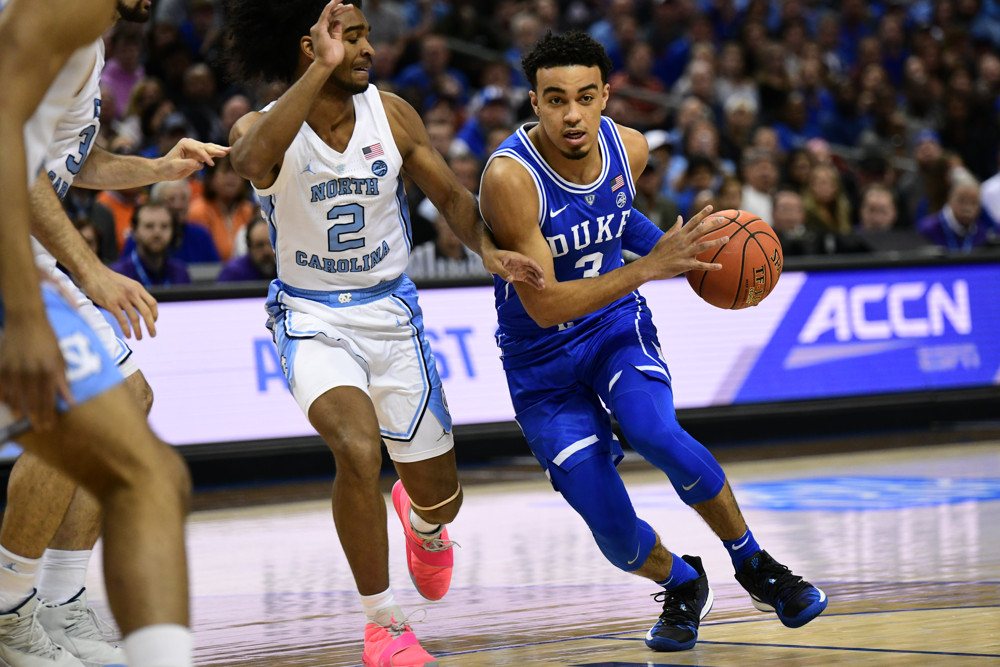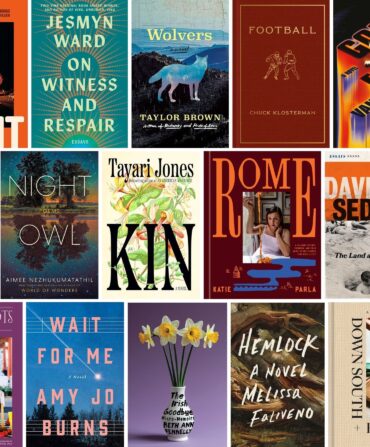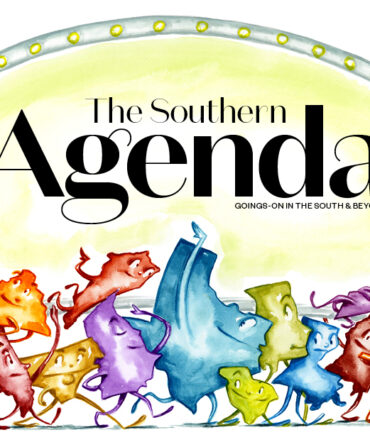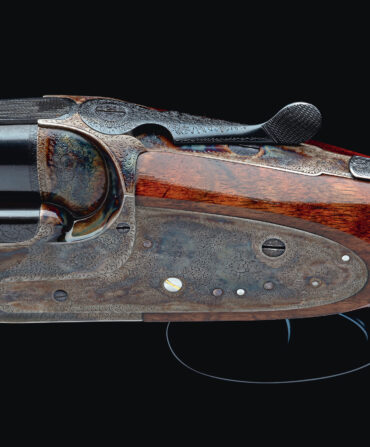My late father was never the biggest basketball fan. He often spent as much time watching my mother and me watching games on television as he spent watching the games themselves. She and I yelled and cried and whined and leapt and swaggered, raising our fists over our heads in victory, slumping down on the couch in defeat. We amused him, we irked him, we appalled him. Except when it came to North Carolina versus Duke. Then he watched the game.
He raised my siblings and me with a joke he repeated many times over the decades, and that helped insinuate us deeply into what I believe is now the greatest rivalry in college sports, and perhaps in all sports, i.e. “How can you tell the difference between a Carolina man and a Duke man?” he would ask. And then he would answer: “A Duke man walks down the street like he owns the whole world. A Carolina man walks down the street like he doesn’t give a damn.”
This coming weekend, however, I confess that I will give a damn, even though I’m a Carolina man who lives in New York City. My father, were he still alive, would give a damn, too. And so will nearly everyone on both sides of the rivalry—players, coaches, and especially fans. North Carolina and Duke will be playing each other this Saturday night for the third time this season and the first time ever in an NCAA playoff game, in this case a Final Four semifinal. The retiring Duke head coach Mike Krzyzewski once told me: “I’m on a continuum. For me, there’s never an event that’s an ending.”
But at long last, there is an event that will be an ending. It will be either a win or a loss and it will remain that forever. And I think Coach K knows and feels that in an almost unbearable fashion. Along with the rest of the world, including me. Which will it be, a win or a loss? Everyone has the same anxieties on both sides of this rivalry, but not the exact same wishes for winner and loser.
* * *
The particulars of this moment raise an already acerbic rivalry to a level that is mind-blowing, the results of which will either be exhilarating or crushing. It’s as if an asteroid is heading our way, and it’s going to hit either Duke or North Carolina, institutions a mere eight miles apart geographically, but infinitely divided in regard to sensibility and aspiration. Or at least that’s how it feels. The asteroid’s landing spot will not be known until late Saturday night.
The Duke–North Carolina antagonism may center on a basketball court and the surrounding stands, but the ferocity of it has a lot to do with class and culture in the South. It’s an ongoing contest between a public versus private university; between primarily in-state versus out-of-state student bodies; and between students who grow up rooting for UNC like breathing the local air versus students who cheer for Duke only when they arrive at Cameron Indoor Stadium and receive a sheet telling them precisely what they’re supposed to chant. It’s a rivalry of such jawboned intensity that it feels in tone with the extreme partisanship of our country these days, though the extremity of the Duke-Carolina partisanship has lasted much longer than our country’s.
Mike Krzyzewski started bringing the competition to a fever pitch as soon as he arrived at Duke in 1980. Yet for all of his success since then—1,202 wins, five national championships—Krzyzewski has continued to feel like he did growing up in a family of Polish immigrants in Chicago. He regarded himself as an unjustly treated minority there; he has also considered himself a different sort of minority within the state of North Carolina, where he and his family have lived for more than forty years and intend to remain. He didn’t feel his basketball team was sufficiently recognized and applauded at the local level. If Duke were a state university, he once told me, there would be statues everywhere in honor of himself and his team. Instead, there’s just a statue on the Duke campus of James Buchanan Duke, holding a fat cigar in tribute to the university’s origins through his family’s tobacco business. “We’re not a state school,” Krzyzewski admitted. “We don’t represent the masses.”
This is Coach K’s final season, of course, an announcement he made last year. I had a brief moment at the beginning of the season when I experienced an idiosyncratic tenderness for the man. He’s seventy-five years old. His leaving felt like the end of history. His fierce presence over the last four decades had helped make for the greatest rivalry in college sports. He made hatred easy to love.
I also respected the passion he has for his family’s Polish origins. I admired his support for the Black Lives Matter movement. And I found myself touched by the kindness he displayed towards his greatest rival (and one of my icons), the former UNC coach Dean Smith. As John Feinstein wrote in The Legends Club, the Duke coach visited Dean at Figure Eight Island on the North Carolina coast near the end of Smith’s life when he was suffering from dementia and confined to a wheelchair. Krzyzewski leaned down, shook his rival’s hand, and told him “I love you.” And this from a coach who once said: “If I ever act like Dean, shoot me.” That day on the coast, Dean responded by squeezing K’s hand with a reciprocal tenderness.
* * *
But speaking of hands…on the other hand, it’s worth considering that neither Dean Smith, nor former UNC coach Roy Williams, who just retired last April, announced their departure prior to their final season. Krzyzewsi’s having done so has resulted (as he likely suspected) in much of the media exerting a sentimental and venerated narrative of K’s last days at Duke, as if a national championship was the only proper reward for such a complicated coach. ESPN, the network Carolina fans tend to call DSPN (the D standing for Duke), has been particularly intent, it appears, on shining a holy light on Krzyzewski, a light which was quite amusing when Duke lost Coach K’s last home game by thirteen points to UNC on March 5, and ESPN had to broadcast the after-loss aggravation by K. “This is unacceptable,” he growled with his players standing nearby in a state of what looked like extreme guilt. On the Inside Carolina website, there’s a photograph of the five Duke starters, entitled “The Unacceptables.”
Given Krzyzewski’s visible uneasiness about the end of his career—will it be an eternal victory or an eternal loss?—and given his clear and everlasting rage for a win, a reasonable question is: Which players will feel the most pressure on Saturday night? Will it be the Blue Devils? Will one-and-done Paolo Banchero be more likely to bang his way to the basket and make shots? Or will he bang his way into charges? Will the extraordinary freshman A.J. Griffin (another one-and-done) continue to hit three pointers from the corner? Will the improving point guard Jeremy Roach successfully zig-zag his way around the court? Or will they feel too nervous, given the expectations and necessities of their head coach?
The same questions can be asked of UNC’s rookie coach Hubert Davis and his players. Will the monumental nature of this game impose an uneasiness upon the Tar Heels? Will Brady Manek continue to sink threes with such precision? Will Armando Bacot still rebound like Moses Malone and avoid being called for early fouls? Will the sophomore guard Caleb Love play sanely, or even if insanely, will he continue to drop in the most essential three-pointers with an abiding fearlessness?
Which team will play with the greatest ease in the midst of the greatest rivalry? The answer is coming soon.
Chapel Hill native Will Blythe is the author of the New York Times best-selling To Hate Like This Is to Be Happy Forever: A Thoroughly Obsessive, Intermittently Uplifting, and Occasionally Unbiased Account of the Duke–North Carolina Basketball Rivalry. He lives in New York City, and has frequently contributed to The New York Times Book Review, Rolling Stone, Esquire, The New Yorker, and the Oxford American, among other publications.








